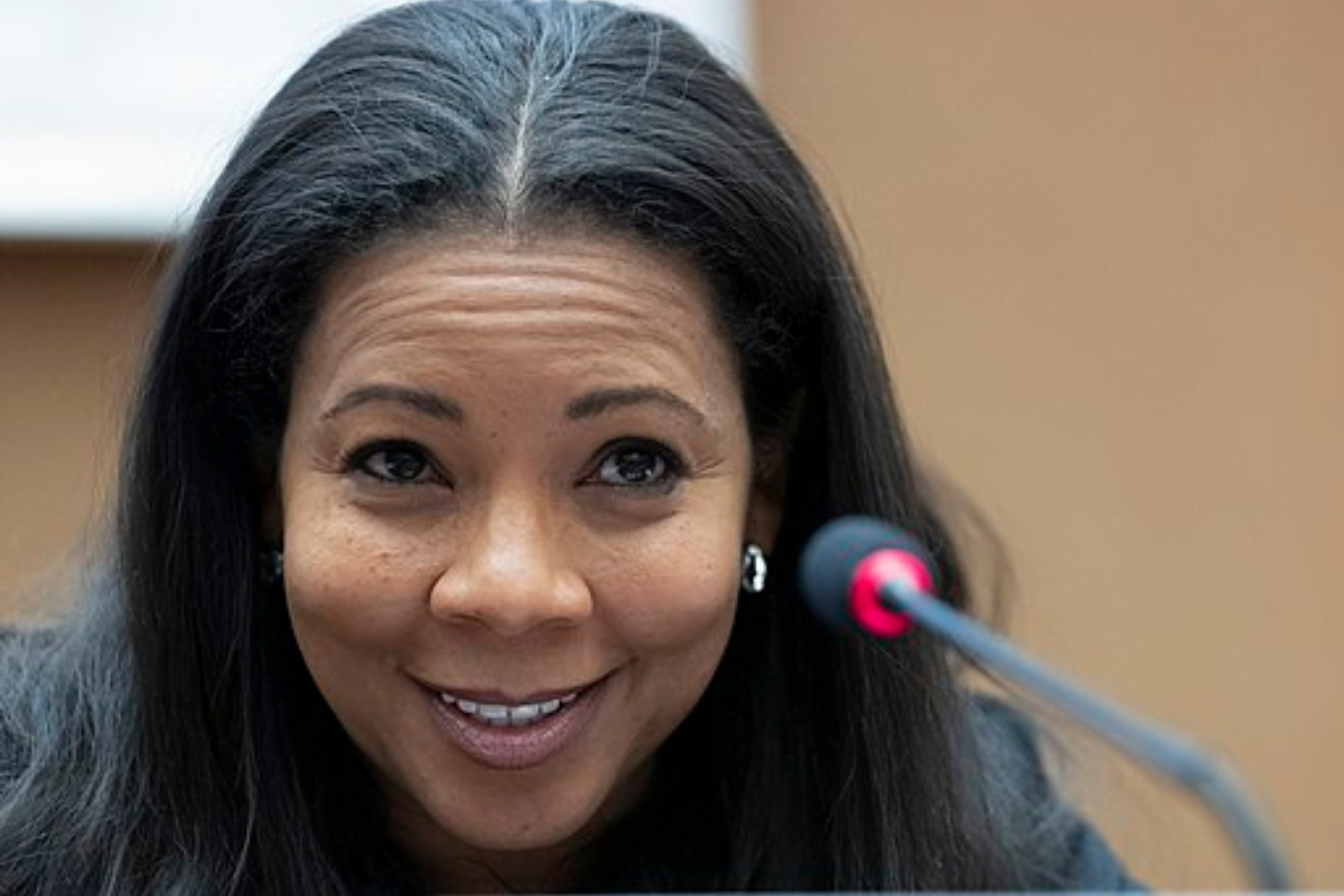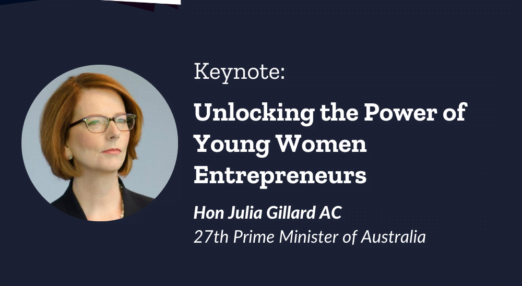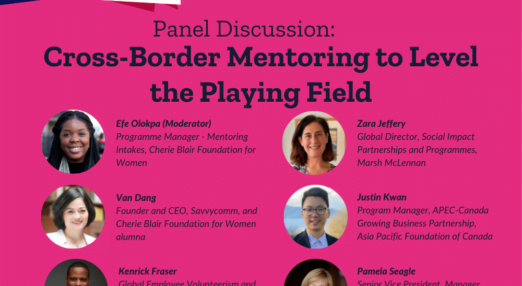Rebecca Enonchong on digital entrepreneurship
Rebecca Enonchong on defying stereotypes and driving change for women in digital entrepreneurship.

Rebecca Enonchong is the Founder and CEO of AppsTech, a leading global provider of enterprise application solutions. Last year, as part of our 100,000 Women Campaign, we were honoured to have her join our Women Entrepreneurs Mean Business summit, where she delivered a speech on defying stereotypes and driving change for women in digital entrepreneurship:
“It’s always so exciting, and inspiring actually, to speak to and speak with entrepreneurs, specifically and especially women. I’m talking about something that’s very near and dear to my heart, which is digital entrepreneurship.
I started a company 22 years ago called AppsTech. I started in the US. It was really a time when there was nobody in my industry (I do enterprise software) that looked like me. It was rather discouraging at the beginning, because nobody expected me to be the Founder and CEO of a company that was intended to be multinational, and was intended to generate millions of dollars. So how did I embark on this venture of starting a company as a woman, as an African woman, and as a foreigner (because I started in the US before venturing to other locations)? I started in 1999, and I started very, very slow.
I put together my business plan, and, based on my business plan, I believed that the company would generate over two million dollars in its first year. For that, I needed to structure the business, to hire staff, and to get customers and clients – so [off] I went on this adventure!

There was nobody in my industry that looked like me. It was rather discouraging at the beginning, because nobody expected me to be the Founder and CEO of a company.
One of the things that helped me is that I actually hid my identity as a woman and as a black African woman. I put the product ahead of me, so I was behind the scenes so to speak. I was promoting a brand (which was AppsTech), and really trying to hide as much as possible. For instance, my business card didn’t show a title, so I could walk in and be a salesperson, an engineer, somebody from procurement; I could change hats very rapidly. I found that even when people knew that I was the CEO and Founder, they didn’t believe it. So, often, I was in meetings and the customer would talk to my colleagues and almost ignore me, as though I was there to take notes.
So, I think it was very timely for the Cherie Blair Foundation for Women’s report to come out today on perceptions and how we perceive ourselves, which I think has been so important in my own journey.
I did make those two million dollars in the first year and went on to generate over 40 million dollars in revenue over the years. I opened offices in seven locations on three continents and had customers in over 50 different countries all over the world. Most of those customers never knew who owned AppsTech. They never knew who the Founder was, or who the CEO was. I’m hoping that the new generation of entrepreneurs can show their face and be the face of their business, which is a luxury that unfortunately I didn’t have at the time.
Read our report on gender stereotypes and their impact on women entrepreneurs
Download the report (2.9MB pdf)
DownloadI think for us to be able to attract more and more women into the tech industry, we need to see more faces like mine. So, it’s very important that we do showcase and promote women that are successful in entrepreneurship, especially women coming from the digital south. It’s not easy to be perceived and we know, those of us who do come from the digital south, the challenges that women already have in general. Specifically, [there is an issue] in being an entrepreneur and being seen as a real business person and not just… One of the words I hate the most is ‘micro-enterprise’, it’s almost as if the only thing that we can do in business is run these ‘micro’ businesses, so we only get ‘micro’ amounts. I always say leave the ‘micro’ to the men and give us, the women, the real money. [By doing this], you will see how much we are able to generate, and how successfully we are able to run our businesses. This idea of perception is so key in trying to help and support more women in getting into digital innovation.
I had this belief early on that if I hid (as I mentioned that I did) behind this business and just promoted AppsTech, it was such an equaliser. We all know that when you have an application and it’s on a mobile phone, you don’t really look to see who created the application, you just download it, and if it works it works. If you’re a woman and you created that application – what a great equaliser! Well that equaliser, unfortunately as I learned, it stops when you start doing banking, when you want access to financial services. All of a sudden, they need to know who is signing the checks. I had so many challenges just maintaining a bank account. I’m not even talking about getting a loan or getting funded, I just [dealt with] so many questions. I actually had an incident in a bank (I’ve told this story several times and they have gotten in touch with me since), but I was refused access to a bank because they said ‘this bank is only for businesses’, so they didn’t let me in. I couldn’t walk in the door.
These things are hopefully starting to change slowly, but too slowly in my opinion. I’m so glad the Cherie Blair Foundation is such a great organisation supporting and mentoring entrepreneurs across the world. It’s so important that women don’t feel alone. You aren’t alone, there are so many of us out there and if we can build this community around mentors, mentees and the Foundation, [we can be] supporting each other and showing each other the way. Sometimes even peer-to-peer mentorship [can be helpful]. Like [having someone else next to you, saying] ‘I’ve been through it, we’re going through it together.’ It’s really what I think we need to progress.
Eventually, people will see us for what we are, and that is successful businesswomen. In the meantime, let’s take advantage of the community that we’ve built around the Foundation and around entrepreneurship.“
Eventually, people will see us for what we are, and that is successful businesswomen.
Thank you so much for having me, wishing you the best for the rest of the day and [hoping you can] get all the tools that you need to make your business sustainable and successful.
Read more from the Women Entrepreneurs Mean Business summit
-

Hillary Clinton on women’s equality and breaking glass ceilings
Hillary Clinton and journalist Barkha Dutt discuss breaking gender stereotypes and empowering women entrepreneurs.
Read more
-

Hon. Julia Gillard AC – Unlocking the Power of Young Women Entrepreneurs
Keynote speech by Hon. Julia Gillard AC for the Women Entrepreneurs Mean Business summit, exploring and challenging the gender stereotypes holding women entrepreneurs back from success and equality. Because we won’t wait 250+ years for women to have economic equality.
Read more
-

Panel discussion: Cross-Border Mentoring to Level the Playing Field
A panel discussion from the Cherie Blair Foundation for Women’s Women Entrepreneurs Mean Business summit, exploring and challenging the gender stereotypes holding women entrepreneurs back from success and equality. Because we won’t wait 250+ years for women to have economic equality.
Read more
